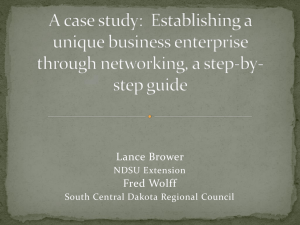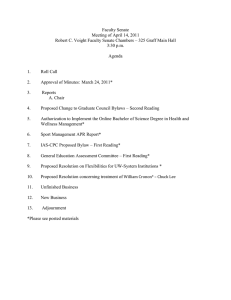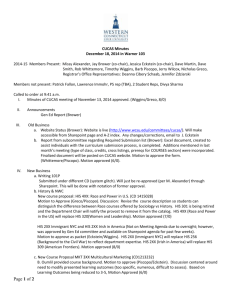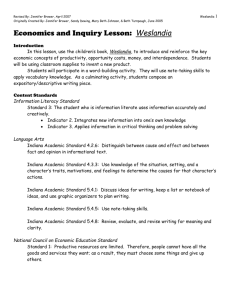Faculty Senate Vol. 47, No. 5
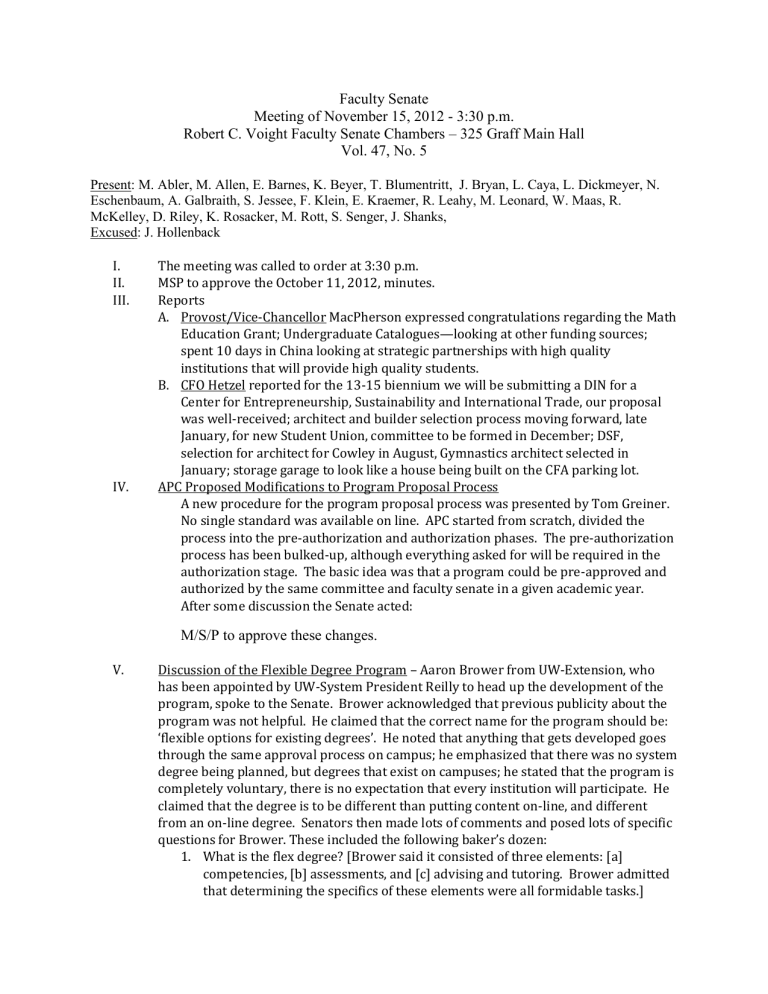
Faculty Senate
Meeting of November 15, 2012 - 3:30 p.m.
Robert C. Voight Faculty Senate Chambers – 325 Graff Main Hall
Vol. 47, No. 5
Present: M. Abler, M. Allen, E. Barnes, K. Beyer, T. Blumentritt, J. Bryan, L. Caya, L. Dickmeyer, N.
Eschenbaum, A. Galbraith, S. Jessee, F. Klein, E. Kraemer, R. Leahy, M. Leonard, W. Maas, R.
McKelley, D. Riley, K. Rosacker, M. Rott, S. Senger, J. Shanks,
Excused: J. Hollenback
I.
II.
The meeting was called to order at 3:30 p.m.
MSP to approve the October 11, 2012, minutes.
III.
Reports
A.
Provost/Vice-Chancellor MacPherson expressed congratulations regarding the Math
Education Grant; Undergraduate Catalogues—looking at other funding sources; spent 10 days in China looking at strategic partnerships with high quality institutions that will provide high quality students.
B.
CFO Hetzel reported for the 13-15 biennium we will be submitting a DIN for a
Center for Entrepreneurship, Sustainability and International Trade, our proposal was well-received; architect and builder selection process moving forward, late
January, for new Student Union, committee to be formed in December; DSF, selection for architect for Cowley in August, Gymnastics architect selected in
January; storage garage to look like a house being built on the CFA parking lot.
IV.
APC Proposed Modifications to Program Proposal Process
A new procedure for the program proposal process was presented by Tom Greiner.
No single standard was available on line. APC started from scratch, divided the process into the pre-authorization and authorization phases. The pre-authorization process has been bulked-up, although everything asked for will be required in the authorization stage. The basic idea was that a program could be pre-approved and authorized by the same committee and faculty senate in a given academic year.
After some discussion the Senate acted:
V.
M/S/P to approve these changes.
Discussion of the Flexible Degree Program – Aaron Brower from UW-Extension, who has been appointed by UW-System President Reilly to head up the development of the program, spoke to the Senate. Brower acknowledged that previous publicity about the program was not helpful. He claimed that the correct name for the program should be:
‘flexible options for existing degrees’. He noted that anything that gets developed goes through the same approval process on campus; he emphasized that there was no system degree being planned, but degrees that exist on campuses; he stated that the program is completely voluntary, there is no expectation that every institution will participate. He claimed that the degree is to be different than putting content on-line, and different from an on-line degree. Senators then made lots of comments and posed lots of specific questions for Brower. These included the following baker’s dozen:
1.
What is the flex degree? [Brower said it consisted of three elements: [a] competencies, [b] assessments, and [c] advising and tutoring. Brower admitted that determining the specifics of these elements were all formidable tasks.]
2.
How can someone get a degree if only a few departments are involved? [Brower replied that the aim of the program is adult students seeking degrees, not traditional students. Brower mentioned that the UW—Colleges are working on developing an AAS degree, and UW-M is developing a business certificate as parts of this program for piloting next semester.]
3.
How will institutions be compensated for flex-degree involvement? [Brower replied that there will be a DIN request for new money to support the program,
UW-System is clear that existing funds are not to be used.]
4.
How will the program generate money? [Brower said that students will pay tuition and for a registration process.]
5.
Why do we want to do this? [No clear answer was shared.]
6.
How will we make this work for the 4 requirements for a degree [general education, major, minor, college requirements] ? [No clear answer was provided, in addition to references to the UW-Colleges and UW-M’s pilots already mentioned.]
7.
Why should we think this will work? [Brower said that the Western Governors is proof of concept for such a program, and that we should be thinking about a
“new way of education”.]
8.
The transfer question: [Brower granted it’s thorny, we will have to figure it out.]
9.
How to deal with non-self-directed students? [Brower said we need to figure out the right role for the advisor/mentor/tutor.]
10.
Why not roll out the program in 5 years not 2? [Brower admitted that it was not a realistic quick planning cycle.]
11.
Since the Western Governors Program is not favorably reviewed, why should
UW-System do something like it? [Brower said that WG not doing some things well at all.]
12.
How will we evaluate the program for success besides getting money? [Brower said that we will have to face that, it will be a long term process.]
13.
Why do we need a new bureaucracy? [Brower claimed that the process would be too hard to any single institution to handle.]
There were numerous additional questions. The general tenor of the discussion seemed to indicate that senators did not feel significantly enlightened about the new flex-degree program, how it would work, or why it was needed. The senate will consider how to respond formally to UW-System regarding the program at its next meeting.
The senate adjourned at 5:15 pm.
Respectfully submitted,
Eric Kraemer, Secretary
